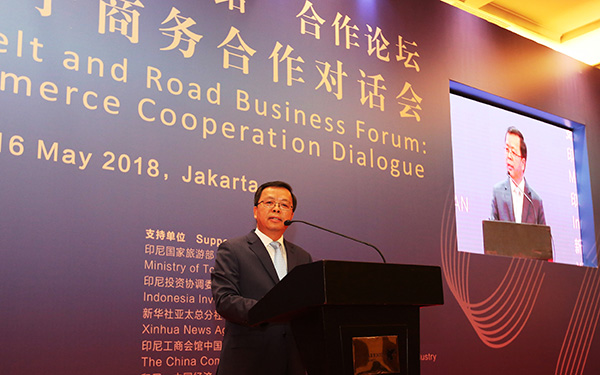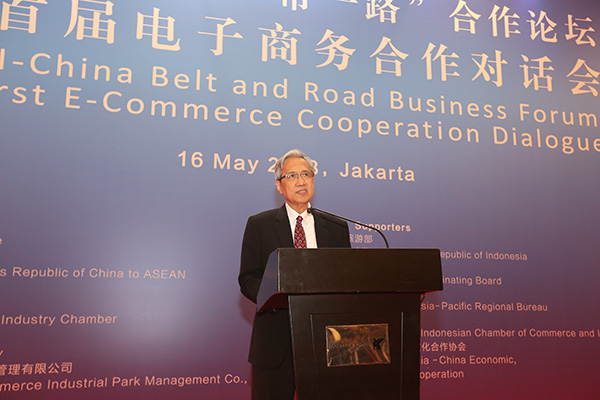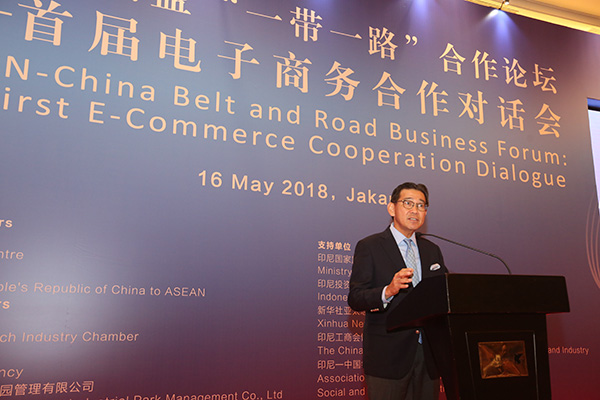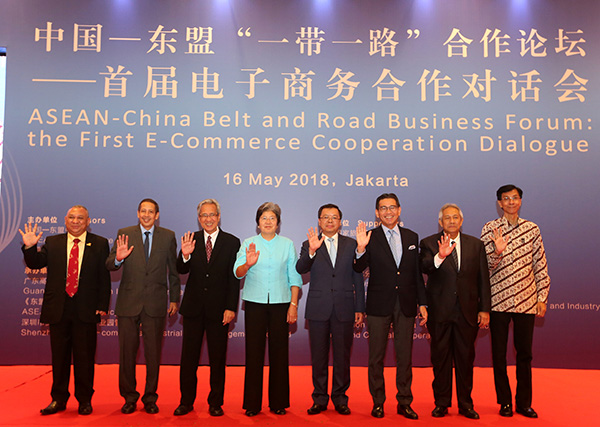
On 16 May 2018, “ASEAN-China Belt and Road Business Forum: the First E-Commerce Cooperation Dialogue”was successfully launched in Jakarta, Indonesia. Attended the opening ceremony were H.E. Dr. Aladdin D. Rillo, Deputy Secretary General of ASEAN, H.E. Mme. Yang Xiuping, Secretary-General of ASEAN-China Centre (ACC), H.E. Mr. Huang Xilian, Permanent Representative of the People’s Republic of China to ASEAN,H.E. Mr. Tan Hung Seng, Permanent Representative of Singapore Mission to ASEAN, other representatives from relevant ASEAN Member States Mission to ASEAN, government officials from Brunei, Indonesia, Lao PDR, Malaysia, Viet Nam, entrepreneurs from China and Indonesia, Chinese entrepreneurs in Indonesia, chambers of commerce from China and Indonesia, as well as media representatives, totaling nearly 500 people.

Ambassador Huang Xilian delivered remarks at the opening ceremony. He said that ASEAN is apriority for China’s external cooperation, and a key region of pushing forward the Belt and Road Initiative (BRI). In the past five years, the BRI has played an important leading role in the efforts to upgrade the cooperation between the two sides. Recently Chinese Premier H.E. Mr. Li Keqiang paid a successful visit to both Indonesia and ASEAN Secretariat. Premier Li stressed that China would work with ASEAN to seize the opportunities in the new round of technological and industrial revolution and synergize our development initiatives in innovation and stand ready to share the Chinese experience on the Internet Plus model and the massive entrepreneurship and innovation initiative. These efforts would give fresh impetus to our business cooperation and innovation-driven development. China has become a leader in global digital economy as a result of implementing innovation driven development strategy. Years of vigorous development have made ASEAN a new hot spot of e-commerce. Cooperation in e-commerce has greatly enhanced flow of goods, information and personnel between China and ASEAN. He suggested that the two sides to further strengthen strategic synergy and deepen coordinated development, further strengthen government guidance and identify cooperation priorities, and to further strengthen enterprise cooperation and fulfill win-win results.
Deputy Secretary General Aladdin D. Rillo highlighted in his remarks that digital economy is an important driving force for innovation, competitiveness and economic growth. The development of e-commerce has greatly increased productivity and market efficiency and promoted cross border economic cooperation. China owns the largest e-commerce market while the total e-commerce volume is expected to reach USD 20 billion by 2025. Cooperation between the two sides in relevant areas enjoys huge potential and broad future. The ASEAN Declaration on Innovation was signed at the ASEAN Summit in November 2017. It is expected that the ASEAN Agreement on E-commerce be signed within this year, which would provide a blueprint for the future development of digital economy in ASEAN. Currently both sides are synergizing the Master Plan on ASEAN Connectivity 2025 and the Belt and Road Initiative, with digital link as a key component of connectivity. ASEAN is ready to work with China to further deepen cooperation in such fields as infrastructure, information and communication technology as well as digital payment, and jointly push forward the sustainable and healthy development of e-commerce to benefit the people of the two sides.

Ambassador Tan Hung Seng , Permanent Representative of Singapore Mission to ASEAN,said in his remarks that the Forum co-hosted by ACC and Chinese Mission to ASEAN was important and timely. As a new business model, e-commerce has changed the traditional way of purchase, sale and consumption, and provided a new platform for SMEs. China has rich experience in e-commerce while the e-commerce in ASEAN is emerging. The year 2018 has been designated as the ASEAN-China Year of Innovation. As the chair of ASEAN in 2018, Singapore came up with “Resilience and Innovation” as the yearly theme of ASEAN. ASEAN should seize the opportunity of global digital economy revolution, continuously break new grounds, push forward the ASEAN Agreement on E-commerce, forge an integrated development framework for E-commerce and innovation network for ASEAN, and strengthen cooperation with all partners including China, so as to make full use of the stimulation of e-commerce on regional trade and development. He hoped that ASEAN entrepreneurs could learn from the Chinese experience in developing e-commerce while their Chinese counterparts would have a better understanding of ASEAN market through this forum.

Mr. Vinsensius Jemadu, Director General for Greater China Marketing Development of Indonesia Ministry of Tourism said in his remarks that e-commerce has changed the traditional way of tourism promotion and travel modes. The vigorous development of e-commerce has been a strong boost to tourism. The number of Chinese tourists to Indonesia has increased rapidly in recent years, making China the biggest source country of foreign tourists for Indonesia in 2017. He hoped that all participants could share their experience on e-commerce development and provide suggestions on deepening Indonesia-China and ASEAN-China cooperation in e-commerce, so as to further enhance economic cooperation and personnel exchanges, and to achieve common development.
Ms. Ir. Tjahya Widayanti, Director General of Domestic Trade of the Ministry of Trade of Indonesia, indicated in her remarks that ASEAN is the most dynamic region in the world with the fastest growth speed. ASEAN e-commerce market has witnessed rapid development in the recent years. ASEAN has formulated ASEAN Work Programme on Electronic Commerce 2017-2025 and strives to develop digital economy and e-commerce. Indonesia attaches great importance to the stimulation effect of e-commerce on economic development. On-line retail volume of Indonesia reached USD 1.1 billion in 2014 and kept an annual growth rate of 38% for the last 3 years. Currently Indonesia is actively pushing forward the development of high value-added industries and infrastructure construction, with a vision to make the Indonesia digital economy the biggest one in ASEAN by 2020. She suggested that the two sides should further strengthen cooperation in connectivity, training and technology, and jointly promote regional development and prosperity.